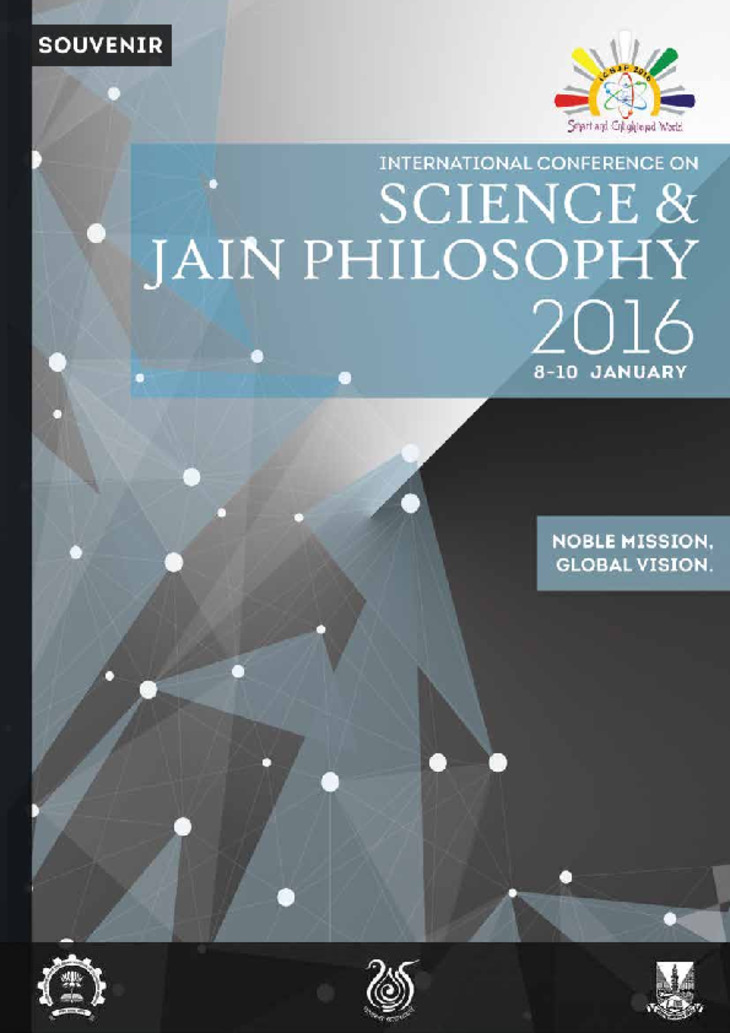
International Conference on Science and Jain Philosophy
 Dr. H. R. Nagendra, PhD in Mechanical Engineering from IISc, Bangalore is the president of VYASA and the Chancellor of S-VYASA Deemed University. He has published 30 Research Papers in Engineering; authored and collected 110 papers on Yoga and co- authored 35 books on Yoga. He has guided nearly 20 PhD students.
Dr. H. R. Nagendra, PhD in Mechanical Engineering from IISc, Bangalore is the president of VYASA and the Chancellor of S-VYASA Deemed University. He has published 30 Research Papers in Engineering; authored and collected 110 papers on Yoga and co- authored 35 books on Yoga. He has guided nearly 20 PhD students.
Principle of Jaina Ethics
Ethical discipline is an important aspect of Jainism. It has a twofold objective i.e. spiritual purification and making an individual a worthy social being. The ethical discipline is well graded in Jainism to suit an individual. It is prescribed according to his will to carry it out sincerely, without any negligence either in its understanding or in its practice. Jaina ethics is based neither on oneness of life as in Vedanta, nor on momentary nature of soul as in Buddhism. It is based on equality of life. Basically all souls are equal. The social organizations as anticipated by Jaina ethics, do not make any distinction on the basis of caste, creed or colour.
The metaphysical Reality or Truth of logical coherence will remain merely a theoretical possibility unless it is translated into good of life through right-living. In fact, the Reality or Truth is supra-logical and can be better realized by living it practically than by speculating on it intellectually. Indian philosophy in general and Jainism in particular, therefore, ascribes the supreme place of all the branches of philosophy to ethics. The foundation of the ethical discipline is the doctrine of Ahimsa. If we correctly comprehend it, it will be seen that it is the recognition of the inherent right of an individual to live, and is generally expressed that every one wants to live and no body likes to die. No one has any right to destroy or harm any other living being. Viewed as such Ahimsa is the fundamental law of civilized life and rational living, and thus forms the basis of all moral instructions in Jainism.
Jaina Ethics for Present Day Problems of Global Civilization.
Syādvāda, which has become almost a synonym for Jainism, teaches us that the same truth could be differently expressed without involving us in any real contradiction.
Jainism has always kept the problems of global civilization in view, and shown the utility of Jaina ethical concepts for humanity in general. Jaina ācāryas have always stood for the dignity of man, and equality of all, advocated the birth-right of independence of all individuals and have preached the elevated ideal of non-violence. When there is realization of the true nature of the self and when one is completely absorbed in the bliss of self-realization, the observance of all the moral rules become spontaneous, coming from within and not being imposed from out. No ethical study could be useful unless it provides an answer to the problems with which our lives are beset. The problems of global civilization arise out of various factors, which can be classified under the following broad categories:
- Selfishness
- Ignorance
- Scarcity
- Injustice
Selfishness-Selfishness lies at the root of all global problems. All immoral practices of global civilization arise out of selfish nature of man. Selfishness can be overcome by realizing the true nature of the soul.
According to Advaita Vedānta, the individual soul (ātmā) is identical with the universal soul (Brāhman).This broadens our outlook and lifts us above selfishness. Buddhism, on the other hand, asks us not only to destroy our ego but also to believe that the soul, for which we struggle so much, is a non-entity. Both of these views represent idealism, where as Jainism is a realistic system. It propounds that the soul is a real, permanent entity and that each soul has a distinct existence. What Jainism lays down is neither a belief in the unity of life nor in the nonentity of the soul, but a distinction between the soul (jiva) and the non-soul (ajīva) and a victory over passions, which are based on a false conception of the identity of the two.
The above ethical idea, which Jainism gave with reference to individual Sadhana, could be interpreted afresh in the context of modern day global problems to suggest that all nations of globe could also maintain their individuality, and yet live in peace and harmony if negative ideas of anger, pride, hypocrisy and greed could be renounced.
Ignorance-In spite of spread of education in modern times, the problems of life seem to multiply rather than decrease. Of what use is knowledge, which binds us rather then liberate? Jainism teaches us that all knowledge is relative and co-related. Let us be receptive to every thought. One sided attitude only complicates global problems rather than solve them. It does not give us any solution to such ethical questions as
'determinism' and 'freedom of will'. Non-absolutism shows us the path of synthesis among fate and human effort; faith, knowledge and action; and supra- moral plane of life and practical code of morality. The answer of Jainism to the problem of knowledge is represented in its doctrine of non-absolutism. Much of misunderstanding between one nation and the other of globe could be solved if we could adopt the attitude of non-absolutism on political problems.
Scarcity-'The greater the possessions, the greater the happiness" is the motto of many. Jainism and yoga teach us quite the opposite: "the lesser the possessions, the greater the happiness". Happiness comes from what we are and not from what we possess. We should realize the blissful nature of the soul, becomes free and be not the slaves of worldly
objects. This puts an end to the struggle for wealth and other possessions The answer of Jainism to the problem of scarcity is: Be not attached to the worldly objects; be not their slaves; turn to the self within; from within comes the happiness. It is a state of inner peace and harmony. This does not imply a life of inertia, but a state dynamic equilibrium of contentment and action.
(iu) Injustice-The bigger fish swallows the smaller ones. The mighty and the aggressive prosper; the humble and the meek suffer. The result is the rule of jungle. In the sphere of
politics we kill and crush in the name of caste, creed and colour. The result is war and bloodshed. Jainism brings us hope of justice in the form of doctrine of karma. As we sow, so shall we reap. All lives are equal and the stronger have no right to do any injustice to the weaker and if they do, they don't harm anybody but themselves. We should meet on injustice not with force but with forbearance. Violence begets violence, enmity leads to enmity: but if we don't retaliate it, subsides. In fact, the haves should spare more and more for others rather than becoming greedy and increase their possessions. This principle of cast system in our society that the Brahmins should live a life of simplicity, austerity, less and less for themselves and more and more for others, sharing with love are all brought to practice in Jainism. Jainism has also opposed from the beginning to any social injustice arising out of wrong notions of casteism or racialism. The creed of non- violence, if applied to the global problems, has the potentiality of wiping out the institution of war from the surface of global civilization. Thus, the answer of Jainism to the problem of injustice is fourfold: doctrine of karma, equality of life, non-violence and equanimity.
Non-violence and its Role in Peace and Harmony of Global Civilization
It is a very well known fact that the man of today is living in a world which is much more complex than that of an ancient or mediaeval man. Independence among nations has increased and this has brought an ever widening and deepening impact on the economic, intellectual and social conditions of our existence. Jain ethics has both the eyes of the individual as well as the social betterment. Social dependence cannot rob individual freedom to achieve spiritual individuality. Thus, the individual and society influence each other. The individual moulds and is melded by society.
Ahimsa with the Jain doctrine of nayavada can very well serve as the supreme principle of morality. Hence there is nothing in the world or even out of it that can be called good except the principle of Ahimsa of all beings as the manifestation of divine love for all creation. The establishment of international organization and the tendency towards disarmament are the symptoms of the inefficacy of force, war and violence to act as arbiters among international disputes. "Thus the principle of non-violence really implies that life should be elevated altogether from the plane of force to that of reason, persuasion, accommodation, tolerance and mutual service." The virtues of non- violence and Aparigraha are capable of establishing universal peace. Jain ethics believe, Ahimsa means universal love. Non-violence cannot be materialized in the life of the country without extirpating the passion of greed. The root cause of violence is material goods. If the importance of the virtue of Aparigraha is understood at the international level, the attitude of non-violence will synchronize.
Moral Ideals of Jain Ethics
The attainment of bliss is the objective of Jain ethics to be aimed at. Brahma is the delight of life, mind, the fullness of peace and eternity. The Taittiriyopaniad compares Brahmanicblisswithothertypesofphysicalblissesandafterenumeratinganumberof blisses enjoyed by men, gods etc. It may be pointed out here that the spiritual bliss is the highest bliss and no physical bliss can stand comparison with it. Jain ethical ideal may be expressed in terms of action. The Isopanisad tells us that "a man should try to spend his life span of a hundred years only in the constant performance of actions, but in detachment. It is, thus, only that we can hope not to get contaminated by actions.
According to Bhagavaṃ Gita, karma-yoga or the Life of activism constitutes the supreme end to be aimed at. It is, no doubt, true that we can find passages in the Gita where Jnana is superior to karma, where karma is superior to Jnana and where they are at par. But the law of body, the Law of society and the Law of universe indicate and even vindicate activism. The Gita tells us that the actions should be performed after brushing aside all attachment to and the desire for the fruit Jain asceticism embraces social goodness within its fold along with individual goodness. The Jain concept of Anuvratas is a means between asceticism and sensualist. It completely makes possible the achievement of social goodness and brings about individual goodness at social level. Jainism looks at distorted casteism featured by selfishness with an eye of contempt. The show of superiority of one caste over the other due to wrong notions of selfishness, ignorance, lack of love for one another, non recognition of divinity in every one, is foreign to Jain ethics. So the present deterioration of Casteism is an evil and is based on the passions of hatred and pride. There is only one caste, namely manhood. Merit of selflessness is the basis of caste and the arrogant pride of caste destroys right living. If the modern democratic set up is to be made successful, the wrong notions of casteism must be abolished.
 Dr. H.R. Nagendra
Dr. H.R. Nagendra
